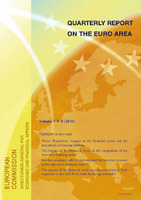European Economy. Quarterly report on the euro area 2010.

working document
Συγγραφέας
European Commission
Ημερομηνία
2010-10-20Προβολή/
Θεματικές επικεφαλίδες
Economic and Financial AffairsΠερίληψη
As the tumultuous year of 2010 draws to a close, the euro-area economy presents itself in a complex state marked by a certain ambivalence of fortunes. While great achievements have been made and considerable challenges remain, one of the most welcome developments has been the strength of the economic recovery this year. The Commission's latest Autumn Forecast, published on 29 November 2010, showed a significant upward revision to euro-area GDP growth, which is expected to reach 1¾% for 2010 as a whole. This encouraging headline figure cannot do full justice to the complex economic forces currently shaping the recovery and the balance of risks. Signs of a softening global environment and the onset of fiscal consolidation entail that activity is likely to moderate towards the end of 2010 and in 2011, but to pick up again in 2012 on the back of strengthening private demand. The recovery also appears to be broadening out. While export growth has been solid for some time, the euro-area economy is now entering the next phase, whereby the pick-up in exports starts to spur investment demand, especially for equipment. Some improvement is also apparent in national public finances as virtually all Member States' deficit is falling in 2011, although debt levels are still trending upwards.
Αριθμός σελίδων
38p.Γλώσσα
ΑγγλικάΣημείωση
http://aei.pitt.edu/id/eprint/94714Highlights in this issue: - Focus: Regulatory changes in the financial sector and the prevention of housing bubbles - The Impact of the financial crisis on the integration of the euro-area banking sector - Has the sovereign debt crisis hampered the recovery process in the euro-area financial sector? - The impact of the financial crisis on corporate finance: how important is the shift from bank financing to bonds?
Volume 9 N°4
